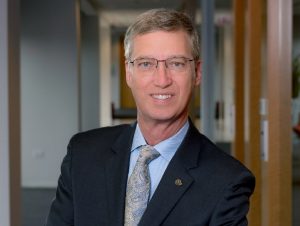Head of AMA talks to Iowa physicians about worrisome scarcity of rural doctors
July 12th, 2024 by Ric Hanson
(Radio Iowa) – The president of the American Medical Association is in Iowa today (Friday) to address the state’s top doctors about key healthcare issues, including Iowa’s worsening shortage of rural physicians. Dr. Bruce Scott is an otolaryngologist and head and neck surgery specialist with a private practice in Louisville, Kentucky. Scott says one of his priorities as A-M-A president is to seek out ways to turn around the exodus of experienced doctors from our nation’s rural areas. “In Iowa right now, 97 out of your 99 counties are partially or entirely designated as Health Professional Shortage Areas,” Scott says. “Iowa actually ranks 45th in the nation in terms of availability of physicians and the patient-physician relationship.”
Scott is speaking before members of the Iowa Medical Society in Des Moines, and says he’s seeing similar problems in Kentucky. In an interview with Radio Iowa, Scott says rural Iowa physicians are retiring in droves and they’re not being replaced by new doctors due to the lower wages, increased administrative burdens, and the rising cost of practice in rural areas. “We need to work to get the physicians who are currently practicing to want to continue practice,” Scott says, “and then we need to work on the other end to get more people into medical schools, into residency and convince them to stay in the rural areas.”
It’s a nationwide problem, as Scott says forecasts show the country will be short 83-thousand doctors in the next decade. He says only four or five percent of today’s medical students identify as being from a rural area. “Medical student debt is huge and sometimes students in rural areas don’t have the financial means,” Scott says. “So one of the things that I know the Iowa Medical Society is pushing for is increased funding for the Rural Physician Loan Repayment Program, so we particularly need more residency programs in rural areas.”
Studies find 80-percent of graduating residents stay within 80 miles of the hospital where they did their residency. Besides medical doctors to address our physical ills, Iowa is also lacking in -mental- health professionals. Beyond incentives for those who pursue degree programs, Scott says licensing and regulatory changes could bring more people into service, but progress is slow. “The American Medical Association actually convinced the federal government to pass what was called parody rules over 10 years ago,” Scott says, “and yet, many insurance companies still do not provide adequate coverage for mental health benefits, partially, I believe, because the federal government never put any teeth into the requirements.”

Dr. Bruce Scott (AMA photo)
The Federal Trade Commission issued a report this week about the negative impact pharmacy benefit managers, or P-B-Ms, are having on the accessibility and affordability of prescription drugs. Health care professionals in the state blame P-B-Ms for driving many small-town Iowa pharmacies out of business, and Scott agrees. “I think the PBMs pose a real problem. They are basically an invisible entity that sucks a lot of dollars out of the healthcare system, and I think that they should be largely eliminated or at least largely regulated,” Scott says. “Not only has it been an impact upon the small pharmacies, it’s been an impact on the patient’s pocketbook.”
He says these companies routinely keep rebates that should go to the patients, or that result in higher prices for prescriptions. The Iowa Medical Society, established in 1850, is the largest and oldest statewide professional association for Iowa physicians representing more than 5,000 members.





